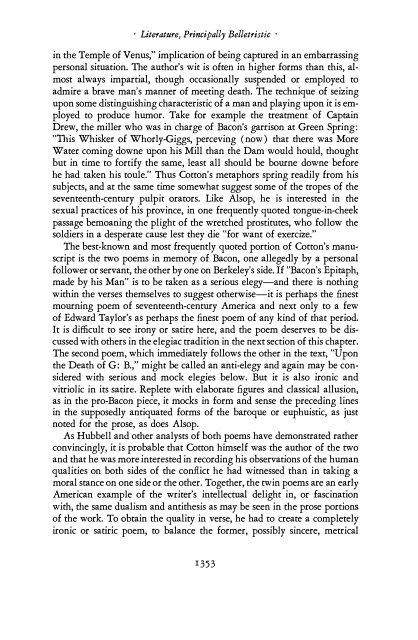Literature, Principally Belletristic - University of Tennessee, Knoxville
Literature, Principally Belletristic - University of Tennessee, Knoxville
Literature, Principally Belletristic - University of Tennessee, Knoxville
You also want an ePaper? Increase the reach of your titles
YUMPU automatically turns print PDFs into web optimized ePapers that Google loves.
· <strong>Literature</strong>,<br />
<strong>Principally</strong> <strong>Belletristic</strong> .<br />
in the Temple <strong>of</strong> Venus," implication <strong>of</strong> being captured in an embarrassing<br />
personal situation. The author's wit is <strong>of</strong>ten in higher forms than this, al<br />
most always impartial, though occasionally suspended or employed to<br />
admire a brave man's manner <strong>of</strong> meeting death. The technique <strong>of</strong> seizing<br />
upon some distinguishing characteristic <strong>of</strong> a man and playing upon it is em<br />
ployed to produce humor. Take for example the treatment <strong>of</strong> Captain<br />
Drew, the miller who was in charge <strong>of</strong> Bacon's garrison at Green Spring:<br />
"This Whisker <strong>of</strong> Whorly-Giggs, perceving (now) that there was More<br />
Water coming downe upon his Mill than the Dam would hould, thought<br />
but in time to fortify the same, least all should be bourne downe before<br />
he had taken his toule." Thus Cotton's metaphors spring readily from his<br />
subjects, and at the same time somewhat suggest some <strong>of</strong> the tropes <strong>of</strong> the<br />
seventeenth-century pulpit orators. Like Alsop, he is interested in the<br />
sexual practices <strong>of</strong> his province, in one frequently quoted tongue-in-cheek<br />
passage bemoaning the plight <strong>of</strong> the wretched prostitutes, who follow the<br />
soldiers in a desperate cause lest they die "for want <strong>of</strong> exercize."<br />
The best-known and most frequently quoted portion <strong>of</strong> Cotton's manu<br />
script is the two poems in memory <strong>of</strong> Bacon, one allegedly by a personal<br />
follower or servant, the other by one on Berkeley'S side. If "Bacon's Epitaph,<br />
made by his Man" is to be taken as a serious elegy-and there is nothing<br />
within the verses themselves to suggest otherwise-it is perhaps the finest<br />
mourning poem <strong>of</strong> seventeenth-century America and next only to a few<br />
<strong>of</strong> Edward Taylor'S as perhaps the finest poem <strong>of</strong> any kind <strong>of</strong> that period.<br />
It is difficult to see irony or satire here, and the poem deserves to be dis<br />
cussed with others in the elegiac tradition in the next section <strong>of</strong> this chapter.<br />
The second poem, which immediately follows the other in the text, "Upon<br />
the Death <strong>of</strong> G: B.," might be called an anti-elegy and again may be con<br />
sidered with serious and mock elegies below. But it is also ironic and<br />
vitriolic in its satire. Replete with elaborate figures and classical allusion,<br />
as in the pro-Bacon piece, it mocks in form and sense the preceding lines<br />
in the supposedly antiquated forms <strong>of</strong> the baroque or euphuistic, as just<br />
noted for the prose, as does Alsop.<br />
As Hubbell and other analysts <strong>of</strong> both poems have demonstrated rather<br />
convincingly, it is probable that Cotton himself was the author <strong>of</strong> the two<br />
and that he was more interested in recording his observations <strong>of</strong> the human<br />
qualities on both sides <strong>of</strong> the conflict he had witnessed than in taking a<br />
moral stance on one side or the other. Together, the twin poems are an early<br />
American example <strong>of</strong> the writer's intellectual delight in, or fascination<br />
with, the same dualism and antithesis as may be seen in the prose portions<br />
<strong>of</strong> the work. To obtain the quality in verse, he had to create a completely<br />
ironic or satiric poem, to balance the former, possibly sincere, metrical<br />
1353















